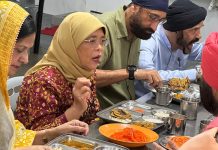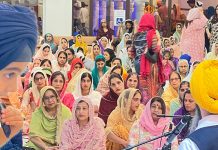| Selayang, Malaysia | 25 Dec 2016 | Asia Samachar |

Tawau Sikhs received a RM30,000 state grant to renovate the only gurdwara in the city located more than 500km from Kota Kinabalu.
The state of Sabah also approved a two-year granthi permit for Gurdwara Sahib Tawau.
“We thank the Sabah Chief Minister and the state government for the grant and the permit,” the Tawau gurdwara committee president Ajaib Singh Maan told a local congregation after a prayer session (Name corrected).
The state grant was facilitated by local assemblyman Tawfik Abu Bakar Titingan.
Ajaib spoke in English with assistant secretary Rajwant Kaur doing a running translating in Punjabi
Earlier, Dr Karminder Singh gave a talk at the gurdwara on ‘Ek Granth and the glory of Sri Guru Granth Sahib’.
The talk is tied to the ‘Ek Granth, Ek Panth, Ek Maryada’ slogan promoted by the Malaysian Gurdwaras Council (MGC). Karminder, a civil servant and an active Sikh volunteer parcharak, is also a member of the MGC Dharam Parchaar Committee.
Some 30 Sikh families attended the programme.
Sabah is a Malaysian state located on the island of Kalimantan. Kota Kinabalu is its state capital.

[ASIA SAMACHAR is an online newspaper for Sikhs in Southeast Asia and surrounding countries. We have a Facebook page, do give it a LIKE. Follow us on Twitter. Visit our website: www.asiasamachar.com]
RELATED STORIES:
Attempted assault on Dr Karminder Singh after talk at Selayang gurdwara (Asia Samachar, 17 Dec 2016)
Driven towards fundamentalism (Asia Samachar, 16 Dec 2016)
‘Ek Granth, Ek Panth, Ek Maryada’ comes to Rawang (Asia Samachar, 15 Dec 2016)
Dr Anurag’s claims on Ek Granth defective to the core, says Dr Karminder (Asia Samachar, 11 Dec 2016)
Kuala Pilah Sikhs lend an ear to ‘Ek Granth, Ek Panth, Ek Maryada’ concept (Asia Samachar, 4 Dec 2016)
Perlis Sikhs do sehaj paath for Ek Panth, Ek Granth, Ek Maryada (Asia Samachar, 30 Nov 016)
Global Sikh body backs Malaysia, US councils (Asia Samachar, 29 Nov 016)
American Sikh Council endorses the “One Granth and One Panth” (Asia Samachar, 28 Nov 2016)
Seremban leadership endorses ‘Ek Granth, Ek Panth, Ek Maryada’ (Asia Samachar, 27 Nov 2016)
Klang gurdwara makes history with launch of ‘Ek Granth, Ek Panth, Ek Maryada’ (Asia Samachar, 24 Nov 016)
Ek Granth, Ek Panth, Ek Maryada: A logo that says it all (Asia Samachar, 3 Nov 016)
All is not well at Akal Takht (Asia Samachar, 20 Oct 2016)
Guru Nanak was an original, says Women In Sikhi conference organiser (Asia Samachar, 16 Oct 2016)
Lord Singh of Wimbledon on Dasam Granth (Asia Samachar, 10 Oct 2016)
SGGS-DG Discourse: Another stumbling block towards Ekta of the Sikh panth? (Asia Samachar, 4 Aug 2016)
‘One Granth One Panth’ call from Global Sikh Council (Asia Samachar, 11 April 2016)
Foreign maids voted at Ipoh gurdwara AGM, MGC ‘regrets’ police presence (Asia Samachar, 3 March 2016)
Ipoh gurdwara AGM: Another volunteer held, lorry driver vows to ‘get back their membership’ (Asia Samachar, 2 March 2016)
Ipoh gurdwara president defends actions, says no more response from him (Asia Samachar, 1 March 2016)
Police show up at Ipoh gurdwara AGM (Asia Samachar, 28 Feb 2016)
JAGIR: MGC managing granthi entry, standardising maryada at gurdwaras (Asia Samachar, 19 Nov 2015)
































Forwarded for information of the Management Committee of Gurdwara Sahib Tawau.
^^^^^^^^^^^^^^^^^^^^^^^^^^^^^^^^^^^^^^^^^^^^^^^^^^^^^
Opinion
Managing gurdwara funds transparently, with accountability
Managing committees of gurdwaras and Sikh NGOs should practice transparency and accountability, its members should possess honesty, integrity and ethical values, says GURSHARAN SINGH
By Asia Samachar – February 14, 2016
1.1 Trust funds are funds which belong to others but managed by people who may be elected-appointed-mandated under various laws-procedures and referred to as trustees. The trust funds can be in the form of cash-landed properties-jewelry-precious stones-stocks-investments-other forms of assets which have monetary values. Trust funds can belong to public, shareholders, religions, charities, beneficiaries, etc. Trustees of public trust fund are the political leaders, of shareholders are the Boards of Directors (BoD), of religions are the management committees (MC) of the various religious institutions, charities are the either elected or nominated or both who constitute the Board of Governors (BoG), Beneficiaries’ funds are as may be prescribed by a will made by the original owner of the trust funds who may be referred to as the ‘administrator’ and in the case where there is ‘No Will’ the inheritance is said to be intestate where the trust funds may be managed by the legally appointed ‘public trustee’ or an approved financial institution or individuals and the civil/religious courts holding funds under dispute or by the Registrar of Unclaimed Monies appointed under law to hold any unclaimed monies until they are claimed by the rightful owners.
1.2 This article will make reference to Sikh gurdwaras providing facilities for worship and religious based functions while non-government organisations (Sikh NGOs) in Malaysia may be established by Sikhs to provide assistance to needy Sikh community members. The main source of trust funds for gurdwaras would be ‘offerings’ [not ‘donations’ or ‘assistance’ as the Almighty does not need donations or assistance as it is the Almighty Who gives to all and to Whom all go to ‘beg’ or ‘give thanks’ in their ‘ardas’]. The Sikh congregation is referred to as ‘Sanggat’ who partake in the various prayer gatherings/functions such as those held periodically, gurpurabs, Vaisakhi, births/birthdays, weddings, anniversaries, thanksgivings, deaths, barsis, recoveries of cooking costs of ‘Langgar’, rental of crockeries/properties if any, etc.
1.3 In addition the gurdwaras may also receive financial grants from governments, corporate sector, organisations or individuals for specific purposes. The support can be in the form of cash, landed properties, jewelry, precious stones, art works, stocks, investments, vehicles, beddings, furniture, fittings, equipment and other forms of assets which have monetary values. Sikh members working in the corporate sector may even get their employers to ‘sponsor’ special prayer sessions for their commercial/financial progress of their companies. The total annual collections of gurdwaras/Sikh NGOs in Malaysia can be few thousands or even hundreds of thousands of Ringgit whereas the value can also be on hundreds of millions of Indian Rupees for the five main gurdwaras (Takhats) in India and other countries.
SEE ALSO: Tips on managing, monitoring construction projects
1.4 Views and comments made in this article may apply to Malaysian gurdwaras and Sikh NGOs and also to those in other countries though degree may vary. However it is not the intention of the writer to point fingers or cast any doubts on anyone in any gurdwaras or Sikh NGOs or their managements. The comments and views detailed here are based on personal observations gathered during my adult life including audit of accounts of some gurdwaras or Sikh NGOs. My humble apologies to one and all if anyone feels offended with my comments/views and further am ever willing to have a discourse or discussion at any time and place mutually convenient with all parties for betterment management of gurdwaras and Sikh NGOs.
• Management of Trust Funds of Sikh gurdwaras and other Sikh NGOs
2.1 Gurdwaras and Sikh NGOs funds are deemed to be trust funds and their operations and management is in accordance with prescribed procedures and rules which are approved by the registered members from the Sanggat or of the Sikh NGOs as appropriate. In addition, the procedures and rules are mandated to be approved by the Registrar of Societies (ROS) as prescribed under the respective laws. The accounts are generally required to be audited by the elected/appointed internal auditors. Some gurdwaras and Sikh NGOs may also be audited by statutory auditors.
2.2. Procedures and rules prescribe that gurdwaras and Sikh NGOs are managed by management committees whose members are generally elected to who hold office for prescribed periods which can be for limited or unlimited periods. The responsibilities of the management committees are to operate the gurdwaras and Sikh NGOs in accordance with what is prescribed in the approved procedures and rules.
2.3 In most cases the function organised are limited to holding kirtan and Guru-ka-Langgar and sometimes for kathas (religious discourses) and weekly programmes for ladies or youths. Kirtan and kathas are generally by local groups and periodically by those from India and other countries whose visit are sponsored by the gurdwaras and Sikh NGOs. Langgar which used to be by sewadaars (volunteers) in the past are currently in many cases especially in cities, done by paid employees. The sewa aspect appears to be disappearing due to possible lack of sewadaars and the skills required to do cooking and making of chappaties. Thus it is becoming common for the sewa of kirtan, katha, langgar and chappatis making being outsourced to paid employees.
SEE ALSO: Roles and functions of a gurdwara
SEE ALSO: Are our Gurdwaras Dysfunctional? The Root Causes
2.4 It has been observed in many gurdwaras and Sikh NGOs that there are individuals or groups of individuals who may compete to take control of the MC. The reason could be that some within the Sanggat may not be satisfied in the manner in which the existing MC operate or manage the gurdwaras and Sikh NGOs and would like to see a change to improve and/or expand the existing activities/functions or they may not be satisfied with the financial management. In such cases the new groups may be from the Y-Generation and professionals [YG-P] who want a change as the older generation MC may not want to change their mindset but stick to just the above stated limited activities as the main or only functions and want to use the surplus funds mainly to renovate/expand the existing facilities so that collections can be increased as some may view equating large surpluses as the main criteria of successful management and leaving the large surpluses as their legacy on their departure.
2.5 Most MC appears to have forgotten the original objectives of gurdwaras as explained by the Gurus which also included giving of assistance to the needy for education, culture, sports, clothing, shelter, finance and other forms which would enable the current and future generation of Sanggat to progress in all spheres. The assistance can also be extended to other communities. This was the expanded use of the daswand which all Sikhs are urged to contribute for the betterment of the Sanggat and other communities as was proclaimed by Guru Ji.
2.6 Recent cases of other trust funds include reports of RM500,000 being donated since 2010 by the Perak state government, RM500,000 or other sums periodically by Johore state and recently RM950,000 by the Federal government. The Kuching gurdwara receives RM20,000 annual grant from the Sarawak state government to maintain the gurdwara building which is gazetted as a ‘Heritage’ building. There are also other cases where government funds have been given to gurdwaras and/or Sikh NGOs from time to time over the past many years.
SEE ALSO: 4 Malaysian Sikh NGOs receive RM950,000 Federal funding
SEE ALSO: SNSM AGM: Win back trust, scrutinise Khalsa Land samelan plan
2.7 It is also common for many MC to send representatives to different parts of the county to other gurdwaras during major religious functions to solicit ‘offerings’ (donations) from Sanggat for their proposed new buildings/facilities or for renovations/extensions of existing buildings/facilities. These include gurpurabs, Vaisakhi and the annual anniversary prayers function such as in Malacca where it was observed that there were over 20 such offerings seekers. Many in the Sanggat felt embarrassed or uncomfortable with the mode as the functions were for three days and the collectors made repeated requests and even equated to begging. Though official receipts were issued many would comment among themselves that they were not sure about their accountability as there was little transparency of funds collected and used as it was never publicised as to the amount collected or was controlled or accounted or had been disbursed. Most just say: “I have given my daswand and discharged my responsibility, now it is between the MC of the respective gurdwaras and Sikh NGOs and WaheGuru Ji.”
2.8 Gurdwaras and Sikh NGOs owning vacant lands or buildings are mandated to have Sikhs of high standing to be trustees in whose name the landed property is registered. This is to safeguard that none in the MC can dispose of the landed properties without the prior approval of the Sanggat and the relevant authorities.
• Management of Trust Funds of Gurdwaras and Sikh NGOs (Transparency, accountability, honesty, integrity and ethics)
3.1 MC should practice transparency and accountability and the members possess honesty, integrity and ethical values. The writer has been voicing without much success, the need for transparency and accountability in respect of trust funds of gurdwaras and Sikh NGOs for several decades and at every possible avenue and opportunity and also emphasising the importance for MC to possess honesty, integrity and Ethics (HIE) as standard culture. Sadly, the extent of transparency appears to be limited to registered members and not available to the Sanggat.
3.2 The reason for the need for transparency and accountability in respect of management and finances is that there have been cases observed by the writer and possibly perception of many in the Sanggat of possible abuse of positions and misuse of trust funds by some MC leading to management fraud, corruption, bribery or kickbacks (MFCBK).
3.3 Reasons for poor management of trust funds could include lack of relevant expertise among MC on matters relevant to management of trust funds. Other reasons for the abuse/misuse may be attributed to greed of some MC with collusion, poor/weak/ineffective internal controls/monitoring and silence of the Sanggat who may be indifferent to the way MC operates or how the trust funds are managed or expended. Another contributory cause could be lack of relevant expertise of those appointed/elected internal auditors and/or their collusion with the MC. The responsibility of the statutory auditors is mainly to give opinion on the compliance to accounting standards which is generally finance-oriented compliance audit which is also the criteria used by the ROS to whom the audited annual accounts are forwarded and thus may be of little value to identify MFCBK risks.
3.4 In some cases the gurdwaras and Sikh NGOs have large accumulated funds and/or assets and steady source of cash collections which they want to control and for which some may even be willing to take control of MC by methods that may have been improper or manipulation or fraud of the elections processes. Thus such rich gurdwaras and Sikh NGOs may become targets of takeover by some unscrupulous individuals/groups as normally happens in many countries where the wealth of countries, companies, charities, religions, NGOs, other organisations, sectors are targets of takeovers.
3.5 It was reported that the top Jathedar post within the main MC of the Akal Takhat in Amritsar which has accumulated wealth of billions of Rupees and annual cash flow of hundreds of millions of Rupees, had multiple candidates who were vying for the top post and included one lady who was then under criminal investigations but little is known of the outcome. Further the State Political leaders also are suspected of wanting to control the vast wealth of the Akal Takhat and its cash resources. The common objective is to take control of the wealth and steady cash flows and thus indirectly control the votes of the Sanggat. Funds of some other religions may also be subject to this culture of gaining control of their religions’ trust funds.
4.0 Accounts of the Gurdwaras and Sikh NGOs
4.1 The accounts of all gurdwaras and Sikh NGOs are required to be audited by internal auditors and in some cases are also audited by statutory auditors. In addition the audited annual accounts are mandated to be submitted to the ROS within the prescribed periods at year end. The audited annual accounts is required to be presented and approved by the members attending the general meetings or as prescribed. The reports listing findings if any, of internal auditors/statutory auditors are rarely presented at general meetings even when there may have been any findings regarding suspected cases of financial mismanagement. Thus the audited annual accounts is generally passed by those attending the general meeting which in most cases is poorly attended by members and those attending may be a fraction of total membership. It is this indifference of the registered members and Sanggat that enables suspected or perceived cases of any MFCBK to continue for years and the MC hold position of power for years and with little improvement.
4.2 Another major weakness observed is that the accounts in most gurdwaras and Sikh NGOs is that they are prepared on cash basis and not on the accruals system. Some gurdwaras and Sikh NGOs may also own landed property (assets) where the value of some of them may be in tens of millions of Ringgit due to development and enhanced land values.
Unfortunately these assets are rarely accounted or shown in the audited annual accounts or even listed to the ‘Attached Notes to Accounts’.The non-accounting of these assets may be referred to as secret or hidden reserves and thus can be the targets of unscrupulous individuals who may intend to misuse/abuse them. The trustees of most of these assets are originally named but the records may not be updated when the original trustees were to cease to be trustees either due to demise or being incapacitated or migration to another state/country.
4.3 Some gurdwaras also own jewelry/precious stones/arts or other assets of value. These are also rarely accounted in the audited annual accounts or listed in the ‘Attached Notes to Accounts’ or in any attached ‘Inventories’. Thus the registered members and the Sanggat may never know of their existence or even if they are still owned by the gurdwara or that they are genuine or have been replaced with imitation/costume jewelry or forgeries by unscrupulous MC members or those who are trusted with their security. There have been many Bollywood movies showing the existence of this fraudulent practice in places of worship mainly in India due to their treasures with intrinsic value to collectors. This risk may also exist in gurdwaras in Malaysia and other countries which possess such treasures.
4.4 Gurdwaras also own other assets such as furniture and fittings, equipment, vehicles, crockery & cutlery all of which also may have in some cases high monetary value but may not be accounted in the audited annual accounts. Some of the furniture, crockery or cutlery may not be subject to effective records/controls of the inventories resulting in some of them sometimes being ‘borrowed’ by individuals but then who ‘forget’ to return and no follow-up to ensure their return.
5.0 Importance and Need for Transparency and Accountability
5.1 The writer has observed and heard and there may be perception among the Sanggat that some trust funds of some gurdwaras and/or Sikh NGOs may be not only susceptible to MFCBK risks but may also have been victims of MFCBK. Even with the involvement of internal auditors or statutory auditors or overseeing by the ROS and installation of closed circuit television/videos (CCTV) may not be of much help in cases of collusion among the perpetrators.
5.2 The writer has come across cases of misuse/abuse of gurdwaras’ trust funds observed during his over 40 years of audit service and audit/scrutiny of some gurdwaras accounts. The cases indicated that trust funds of many gurdwaras and possibly Sikh NGOs may be susceptible to MFCBK risks and thus the transparency and accountability culture is of extreme importance.
Some of the observed examples of suspected MFCBK would include the following.
[a] Rigging of elections to for being elected to control MC and thus the trust funds;
[b] Procurement at inflated prices;
[c] Collections with false/forged receipts and being misappropriated or unaccounted;
[d] False claims of expenses;
[e] Use of trust funds for personal uses;
[f] Award of contracts without transparency or competitive bidding and/or at inflated prices;
[g] Illegal ‘rent’ collections by abuse of position;
[h] Terms and conditions in agreements not in the best interest of the gurdwaras/Sikh NGOs;
[i] Costs charged to trust funds but acquired resources/facilities used for personal businesses;
[j] Poor utilised/abandoned gurdwara buildings/facilities not benefitting Sanggat but still held and occupied by some for personal benefit or indifference;
[k] Poor documentation/records of assets making them susceptible to MFCBK risks;
[l] Available utilities discounts not applied though savings can be high [water, power]; and
[l] Other reasons of which some MC and/or Sanggat may be aware but in collusion or indifference.
• Recommendations
6.1 Based on the above observations and comments it is emphasised and suggested that practice of transparency in management and accounts should be a standard culture as it can lead to accountability and thus encourage MC to practice the culture of ‘HIE’ values. Transparency and accountability combined with ‘HIE’ will assist in the prevention of risks associated with MFCBK.
6.2 It is further observed that there may be gurdwaras which have assets/buildings which may not be in use due to lack of Sanggat or abandoned but are still held though it may make economic sense to ‘sell’ the assets/ buildings and use the proceeds to establish a new gurdwara at another location where there may be enough Sanggat to benefit from the gurdwaras. This could be due to some selfish MC/trustees who may not favour the relocation due to personal reasons though their decision may not be for the good of the majority. This scenario may apply to several gurdwaras which may be located in small towns due to migration of the Sanggat to cities or even to other countries.
6.3 In the case of development within cities some gurdwaras are now located on highly valuable lands though most of the Sanggat may have gone to other housing areas. In these cases it may be more beneficially financially and betterment of the Sanggat to sell the lands and relocate the gurdwara to where the Sanggat has located. The excess funds can be used to construct multi-purpose complexes which can enable having many activities as envisaged by our Gurus. Also the complexes can provide space/facilities to Sikh NGOs to be located within the new complex so that they can discharge their functions more effectively.
6.4 The above recommendations are suggested for the betterment of the Sikh community. Other professionals and experts should be invited to contribute their expertise. It is emphasised again that Sanggat and members of gurdwaras and Sikh NGOs should not be indifferent to the methods in which they function or manage especially the MC and the trust funds and assets. Respective umbrella bodies or ‘gurdwaras and Sikh NGOs have a special responsibility in this respect as they represent all the Sanggat and thus should have continuous monitoring of the MC and funds.
Gursharan Singh, C.M.I.I.A., a retired audit officer from the Malaysian Audit Service, is also a Trainer. This article was written in November 2015. He can be reached via emails at gursharan38@gmail.com or sharwant38@yahoo.com, or via mobile at +6019.2927178 or 603-79718549 or SMS to 6019 number.
Waheguru ji ka khalsa waheguru ji ki fateh.
Gurdwara Sahib Tawau ( GST ) President name is Ajaib Singh Maan. There was an error in typing his name at Asia Samachar. Mr. Ajaib Singh Mann is our long serving President for almost 30 years since the Gurdwara was built at Tawau, Sabah. From : BALJEET SINGH MANN , GST SECRETARY.